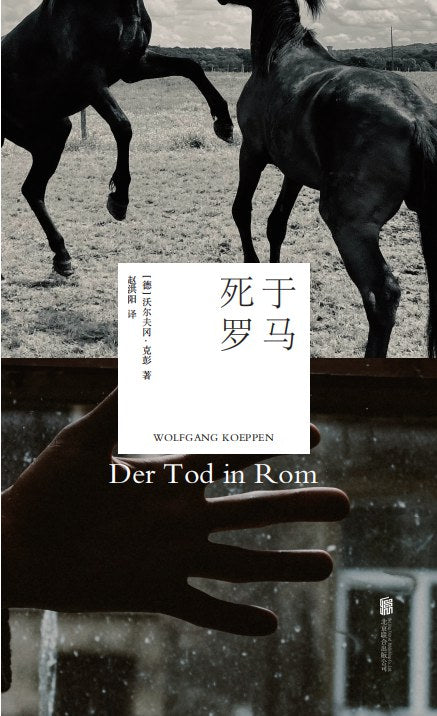1
/
of
1
Died in Rome
Died in Rome
[German] Wolfgang Koeppen Zhao Hongyang 译
Regular price
$19.99 USD
Regular price
$19.99 USD
Sale price
$19.99 USD
Unit price
/
per
Low stock
Couldn't load pickup availability
About Book
About Book
Der Tod in Rom
✦ “People build monuments to the greatness of history, but behind that greatness, everything is ultimately a tribute to death.”✦In Rome, the glorious city full of myths and ruins, the old forces try to make a comeback, while the new generation struggles to break away from the past.
✦Can history really be forgiven or even forgotten?
✧Nobel Prize winners Günter Grass and Nadine Gordimer unanimously praised this work. ✧The final work in the "Postwar Trilogy" by Wolfgang Köppen, winner of the Büchner Prize, the highest award in German literature. ✧A tribute to Thomas Mann's "Death in Venice," it ranks alongside Günter Grass's "The Tin Drum" and W. G. Sebald's "The Emigrants." ✧One of the 100 best German novels of the 20th and 21st centuries, selected as one of the "1001 Books You Must Read Before You Die," and translated into over 20 languages.
Death in Rome is the final work of the "Post-War Trilogy" by the famous German writer Wolfgang Koeppen. It caused great controversy after its publication in 1954, but has now become a well-deserved classic of German literature. It has been translated into more than 20 languages and is Koeppen's most translated novel.
The novel tells the story of the intertwined reunions of disparate members of a German family in Rome after World War II. This fractured portrait of a family includes SS members nostalgic for the war, opportunistic bureaucrats, victims of the Nazi era, and descendants seeking escapism. Each with their own preoccupations, they wander Rome, steeped in myths and historical relics, attempting to come to terms with the weight of their past in their own ways.
In this book, Köppen once again demonstrates his unique writing style: precise observation, delicate description, multiple perspectives, and introspective narrative. With profound insight, he captures the characters' inner and moral dilemmas, explores the conflict between individual destiny and social change, and profoundly interrogates the soul of a nation. The conflict of social change interrogates the soul of a nation through four perspectives: war, bureaucracy, religion, and art.
【Editor's Recommendation】
Nobel Prize winners Günter Grass and Nadine Gordimer have unanimously praised Wolfgang Köppen, a legend of postwar German literature and winner of the Büchner Prize, the highest award in German literature. This is the first Chinese translation of his representative works. Beginning in 1951, Wolfgang Köppen published his "Postwar Trilogy"—"Pigeons in the Grass," "Household," and "Death in Rome," presenting a panoramic view of postwar German society and culture in a unique modernist style. The publication of the trilogy became a groundbreaking event in the German literary world, with renowned German writer and Nobel Prize winner Günter Grass hailing Köppen as "the greatest contemporary German novelist." Within the rich field of modern and contemporary German literature, following Hermann Broch's "The Innocents" and "The Possessed," Köppen's "Postwar Trilogy" represents another classic masterpiece by a major German writer, meticulously translated by young German translator Zhao Hongyang and bound by renowned designer Shan Chuan.
2 [The final work in the "Postwar Trilogy," a tribute to Thomas Mann's Death in Venice, a masterpiece on par with Günter Grass's The Tin Drum and W. G. Sebald.] This book, the third in Wolfgang Köppen's "Postwar Trilogy," garnered a tremendous response upon its publication in 1954 for its bold content and cutting-edge approach. It was hailed as a comprehensive and brilliant provocation to the nation. As renowned German translator Michael Hoffmann put it, "Death in Rome is the most devastating novel about Germans I have ever read." Death in Rome quickly spread to other countries and has been translated into over twenty languages. Death in Rome, along with The Hothouse, and The Dove in the Grass, comprise the celebrated "Postwar Trilogy," and together they established Köppen's status as a master of contemporary German literature.
3. [A cautionary work exploring the entanglement of individual destiny and historical change, reflecting on German and even modern social and cultural thought.] Through the story of the reunion of different members of a German family in Rome after World War II, the novel depicts the fragmented cultural state of postwar German society and the war's legacy. With profound insight, the author captures the characters' inner and moral dilemmas, exploring the conflict between individual destiny and social change, and conducting a profound interrogation of the soul of a nation. The book's language is cold, provocative, and unforgiving, expressing anger at the fatal amnesia that has plagued postwar Germany. It not only criticizes Germany's past but also offers a warning for its present and future.
【Expert Recommendation】
The greatest contemporary German novelist.
—Günter Grass's Death in Rome is the most devastating novel about Germans I have ever read.
—Michael Hoffmann (renowned German literature translator, English translator of the “Postwar Trilogy”)
Köppen's voice is cold, defiant, and unforgiving, a rage against the deadly amnesia that has gripped postwar Germany. Death in Rome reveals Germany's past as well as its present and future.
—The New York Times
Publication Date
Publication Date
2023-10-01
Publisher
Publisher
北京联合出版公司
Imprint
Imprint
Lucida
Pages
Pages
344
ISBN
ISBN
9787559671820
share

